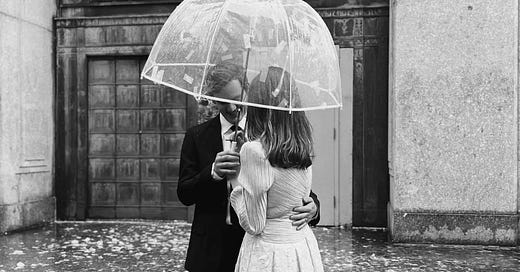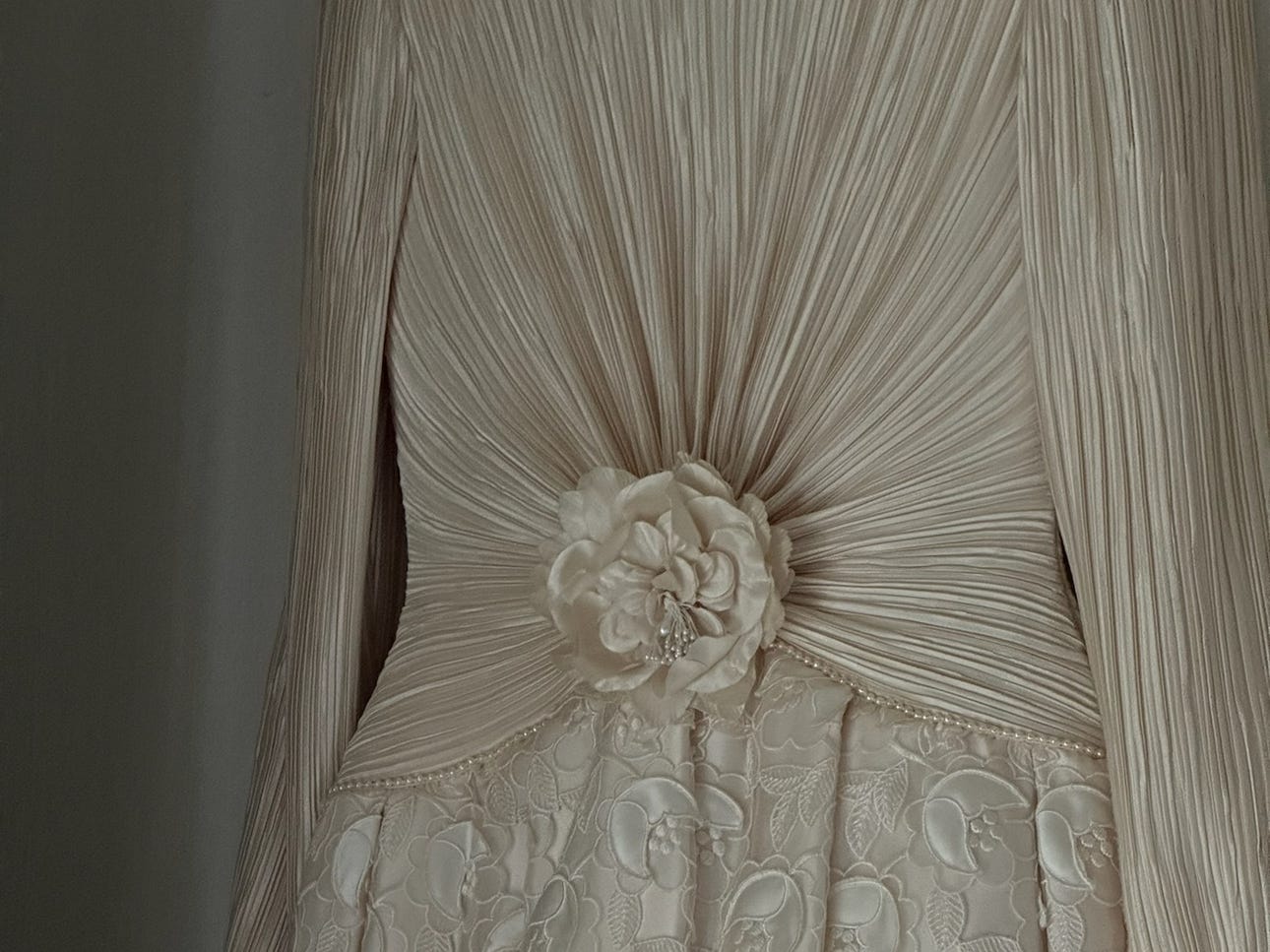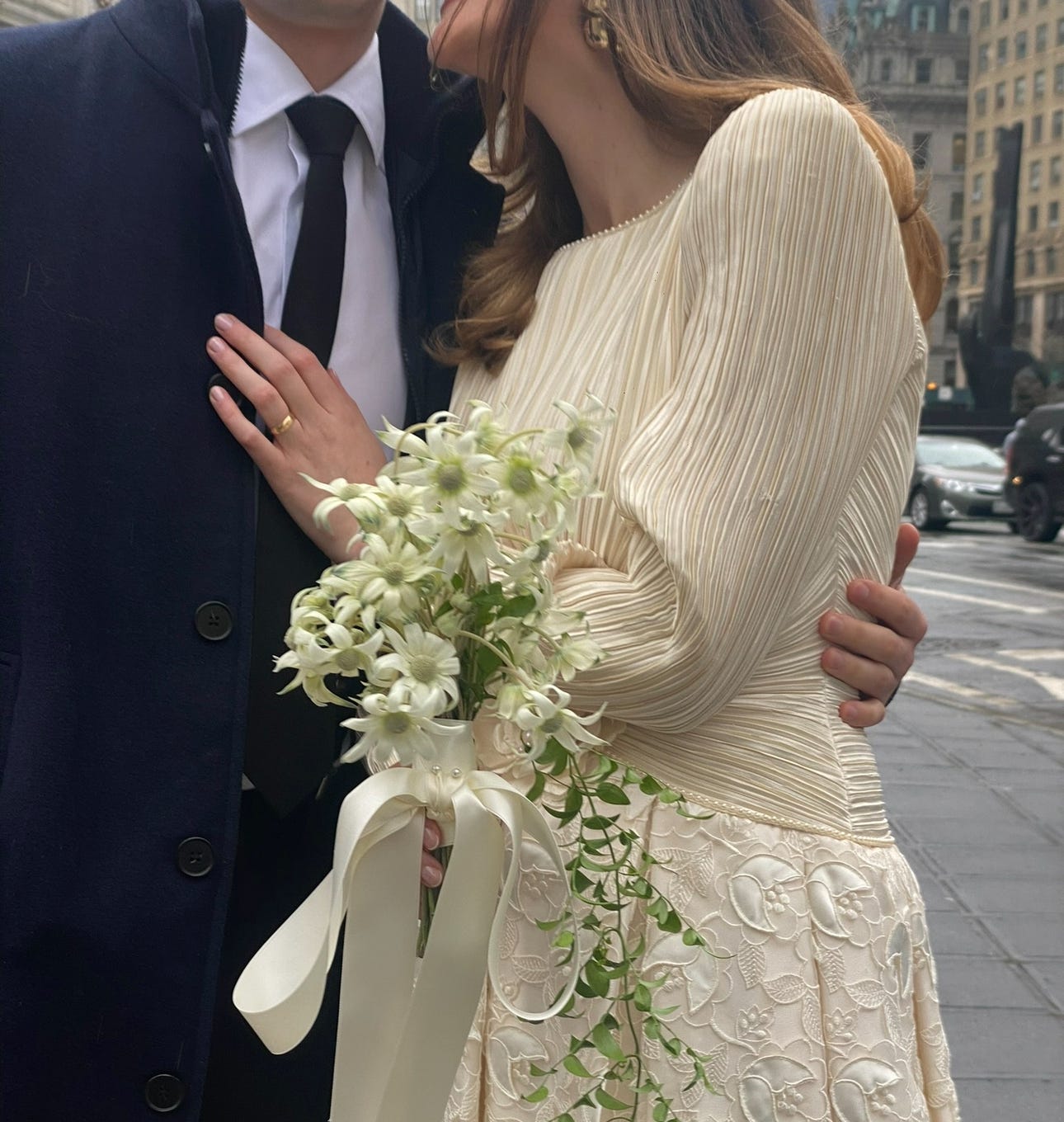what to do if you find yourself on the wrong side of the internet
the article I wrote about my wedding went viral
I don’t think people should publicly criticize other people’s weddings. I’m not saying you shouldn’t have opinions about other people’s weddings; I’m just saying you shouldn’t tell them those criticisms.
To be clear, I’m all for private commentary. If you want to talk to your mom, boyfriend, best friend, neighbor, whoever, about the wedding faux pas you’ve witnessed, go ahead.
I’m specifically referring to this new flavor of online “wedding takedown” where someone gets married and immediately I see another person, who likely does not know the person or attend the wedding, produce a hot take about the ways the wedding was wrong or bad.
And I can guarantee you, the couple will see that commentary. Whether they want to or not. No matter how much they try to mute it, or ignore it, they will see it.
I know this because it happened to me.
Look, I know that weddings can be prickly things.
They’re expensive, $35,000 on average in 2023 (and more in large cities like New York, where the average wedding costs $63,000 according to The Knot). Some celebrity weddings cost 10X that. Weddings as events are laborious and demanding, with the associated festivities swelling to be a multi-day, sometimes multi-continent affair.
Do I think we can examine the wedding industry as a whole, without attacking people’s individual weddings? Yes, I absolutely think we can.
The fascination with weddings is nothing new, but the way we do it has changed. For 130+ years, traditional media has publicized weddings. The debut issue of The New York Times in 1851, “announced the marriage of John Grant and Sarah Mullett, who was from a prominent family in Fredonia, N.Y. At the time, high society marriages were cultural and social news.”
It’s not just an American fascination. According to the BBC, “British Royal Weddings are always very popular on television. The first such occasion to be televised – the marriage of Princess Margaret to Antony Armstong-Jones on 6 May 1960 – was no exception. The biggest Royal event since the Coronation was seen by over 20 million people in the UK, while viewers in Australia, Canada and the USA took the total viewing figures to 300 million.”
In recent years, wedding coverage has expanded and evolved. Charanna Alexander, The Times Weddings editor, spoke about the addition of the Mini-Vows column in this interview. She said, “We’ve tried to tell stories about couples that have absolutely nothing to do with their accolades, but more to do with a love story that is inspirational, in a way, and uplifting.”
In addition to The New York Times and the well-known Vogue Weddings vertical, other magazines have launched wedding coverage, including The Cut, Elle, and wedding-specific outlets like Over the Moon and Anti-Bride.
What does that mean for the weddings covered in those outlets?
As writer and content creator
so eloquently put it, “Weddings, as beautiful as they may be, are not art. They are not books, they are not movies. They have become in recent years an overwhelming industry— dazzling spectacles that the general public is able to participate in from afar. But are they really subject to be reviewed?”I’ve heard the argument that celebrities are public figures and should expect their every move to be discussed. As such, one might argue that celebrity weddings should be scrutinized like any other cultural event. Besides, one might say that celebrities have a whole team of social media staff who deal with their accounts and wouldn’t actually see any criticism themselves.
Shannon addressed this in her essay, “When did it become okay to review weddings?” where she touches on the Olivia Culpo wedding dress controversy. She writes, “Everyone having opinions is nothing new, but everyone having a platform with potentially significant reach, is. In no world should Olivia have ever heard Kennedy’s thoughts on her wedding dress. But we live in a time where the line between celebrity and normal person is blurring.”
What does this mean for anyone whose wedding is shared in traditional or wedding-specific media going forward? Celebrity or not, should they expect to be scrutinized? Many people share their weddings on Instagram or Pinterest, and sometimes larger accounts repost those photos. Should they also be subject to scrutiny? Where do we draw a line? And at what point, do we call on civility, compassion, and just plain old kindness and remind ourselves: This is someone’s wedding.
In this new world where everyone can be a critic, I think we’ve forgotten what the role of a critic is.
It’s to help people.
As world-renowned food critic Pete Wells said about his main responsibility as the restaurant critic for The New York Times, “The job is not to help or to hurt the industry. The job is to help readers.” Meaning he didn’t set out to have a differentiated hot take to grow his own platform, but rather, he sought to help diners find great places to eat. Restaurants are in service to their diners and constructive criticism helps them improve for next time.
But that’s where the analogy breaks down. With weddings, there is no next time. What good does criticism of a wedding do? Honestly. Who does the criticism serve?
Not the bride and groom, that’s for sure. Not the guests. Really, just the person trying to gain social media notoriety by coming out with the wedding takedown first.
Shannon Lange is no stranger to wedding content. She has made 60 videos sharing Vogue Weddings features and documented her fabulous hunt for the perfect vintage Oscar de la Renta wedding dress, amassing a following of 68,600+ on TikTok. She recently started a Substack called
, where she discusses weddings and gatherings of all types.One of the reasons I admire Shannon so much is because she exemplifies how to share about other people’s weddings without snark. This was an intentional decision she made from the start.
“So when I started posting about these celebrity or high profile weddings, I told myself to act as if the bride herself was watching, no matter how famous or out of reach she seemed. That proved to be a smart instinct, because as my following grew and the views went up, the bride or groom would comment and share my video almost every single time.”
She further writes, “If I have nothing nice to say, why say anything at all? The internet is nasty enough, I’d tell myself. Do your fangirl schtick or zip it.”
And this whole section, chef’s kiss!
“I have been a cheerleader, I have called out the little details most people probably don’t notice, and I have kept my videos relentlessly positive. The comments and online interactions have followed suit, I firmly believe you get what you give. But the truth is, it can be much easier to criticize something. It gets you more engagement, it gets people riled up, and if you’re just looking for views (and you can stomach it) it’s there for you. But it gets dark and scary really quickly.
I don’t want to build an audience on snark, and I don’t want anyone to ever feel bad about their wedding. I want to do the opposite! I want to inspire you to think big, think big picture, and stand proudly in your choices— whether they’re the ones I would make or not.”
I experienced a wedding take-down first-hand
After ten years of writing on the internet, I’ve been on the receiving end of the social media horde many times and as much as I can chalk it up to being par for the course of writing online, it never gets less awful.
One month after our wedding, I went on a trip to Copenhagen with my parents. I hugged and kissed them goodbye and walked to my gate, sat down, and opened Twitter to see the first Tweet on my timeline be a photo of my wedding, posted by a stranger.
Someone had written a viral Twitter thread about the Vogue article I had written about my wedding. It didn’t matter that the thread was inaccurate. There’s no fact-checking in an internet takedown. Over 4,000 people favorited it.
My chest constricted with anxiety. I wanted to throw up. More than anything, I wanted to run out of the Copenhagen airport and chase down my parent’s plane on its way back to Michigan and hide in my childhood bedroom.
I will never forget how sad it made me feel.
Here two things can be said. If I didn’t want to be criticized, I could have not written about my wedding for Vogue. Yes, that’s true. But if you pull that thread, then what? Should I not have allowed The New York Times Mini-Vows piece to be published either? Should I not have posted anything about my wedding online? Should we have eloped and not told anyone to not invite any criticism in at all? While that might sound extreme, I actually know some people doing just this.
But that wouldn’t have been true to who I am. For better or worse, I have been writing online for the last ten years and it would have felt strange to not share about one of the biggest events in my life. More than that, I have seen first-hand the beautiful things that sharing vulnerably can catalyze. I have written about shame, sobriety, eating disorders, and a whole slew of topics that terrified me to share. Writing about wedding finances felt like those topics. A bit uncomfortable to share, but worthwhile because it could be helpful to others.
As the piece came together, I was proud because it felt aligned with what I have long believed: sharing about finances helps everyone. I know from the hundred plus emails I received and still receive about the piece that people greatly appreciated seeing an example of a wedding on a budget.
The second point that could be said is that I could just be a tougher person. I could have ignored the thread. Trust me, I tried. I muted the thread everywhere I could. I did not reply. I tried not to read anything. But still it came to me, sent by colleagues and friends. And if you’ve ever been on the wrong side of the internet, you’ll know the overwhelming, heart-stopping feeling of being under attack. I honestly felt so anxious I thought my heart would explode. I would never want someone else to feel that way.
It goes without saying that I’m a generally well-supported person. I have amazing friends, a loving husband, and an incredible family who helped me deal with the hurt. But no matter how much kindness came in and how much I loved my wedding, when I think of that day, there is a dark mark left by someone I don’t know and will never meet, who probably doesn’t even remember what they wrote. That shadow, I am working to remove completely from my memory of the day.
So what can we do?
I will never be able to control how other people act on social media, nor would I ever try to. Telling people not to publicly criticize people’s weddings is a losing battle. All I can do is share how it felt to be on the receiving end. And to remind us all that people online are real people.
What I can control is how I act online.
And I can move with love. Both online and offline.
Doing everything with kindness is a personal goal of mine: I want everyone who meets me to feel loved. If you’ve read this newsletter for a while, you might know about the idea of a “joy soldier,” someone who spreads joy in the communities in which they exist. I want everyone who walks away from interacting with me to feel lighter, whether it’s from exchanging smiles or being listened to.
This idea of being a joy soldier came about when I was in college, because I was obsessed with positive psychology (and still am!). I actually gave a TED talk about rewiring your brain for joy. Our brain is naturally primed for negativity, meaning it takes three times as many positive stimuli to neutralize one negative stimulus.
What if we acted online with this awareness? I can’t imagine what a radically different experience it would be. What if every time someone commented a negative or critical thought, they had to put three more positive comments to balance it out?
What a dreamy online world that would be.
That said, even in the not overly positive online world that does exist today, I’m proud of the articles that I wrote and were written about my wedding and marriage to Gustavo. I don’t regret them being published. I’m grateful for the experience and the empathy I gained. It has transformed how I think about weddings and how I engage with them online.
One of my favorite quotes is this: “Between stimulus and response there is a space. In that space is our power to choose our response. In our response lies our growth and our freedom.” (This quote has long-been cited as Viktor E. Frankl, but there has been some debate on its origins!)
The best thing about negativity is that it gives you a choice. I choose how I respond. This experience has motivated me not to be a passive lurker, but a positive engager. If I can be a steward for the sort of online experience I want others to have, that’s more than worthwhile. Even if I’m just one person.
I will shout to the rooftops with joy for my friends and loved ones, amplifying their happiness. For their weddings, yes, but also for whatever else they’re celebrating. In a world of takedowns, I’m taking up the cause of joy.
Thank you to the many editors who gave feedback on this newsletter! Alexis, Freia, Capri, Nicole, Chloe, Shanece, Russell, and the editing team.









So honored to be included in this piece! My heart sank when I read that you had a "dark mark" on your day. I simply won't stand for that!! You had a beautiful day, exactly as it was meant to be, and you shared it because that was true to you too. What I think people overlooked at the time about your wedding is that the entire celebration was really about the community you and your husband have built. Of course another couple couldn't pull it off in the same way for the same price, because they aren't you guys! Their version of an intimate wedding would and should look completely different, as it would be a reflection of them! People seem to have lost touch with what a wedding is supposed to be, how much things "need" to cost in order to be deemed good online, and while that worries me, weddings like yours being shared help combat that. Of course snarky comments sting, but just remember there were most certainly a lot of silent readers who took something with them that helped them in their planning process, or maybe just helped them think of things a little differently. Bravo on this piece, bravo on your wedding, and I'll see you on the front lines of the cause of joy.
Dear, dear soul! It is such a shame that people forget that ‘social media’ is meant to be ‘social’ not ‘anti-social’. I try to mainly follow positive people and I do my best to ‘spark joy’ wherever I can. Kindness is such a positive attribute!
I adored your wedding posts. I’m so thrilled to be tagging along seeing how your life progresses. So I’m sending loving, protective vibes your way and growling at the daft ‘twits’ that dare to be so hurtful and thoughtless. Sigh…
Take care dear Sarah. You’re a wonderful young lady and I’m so happy to ‘know’ you thanks to Substack. All the best.